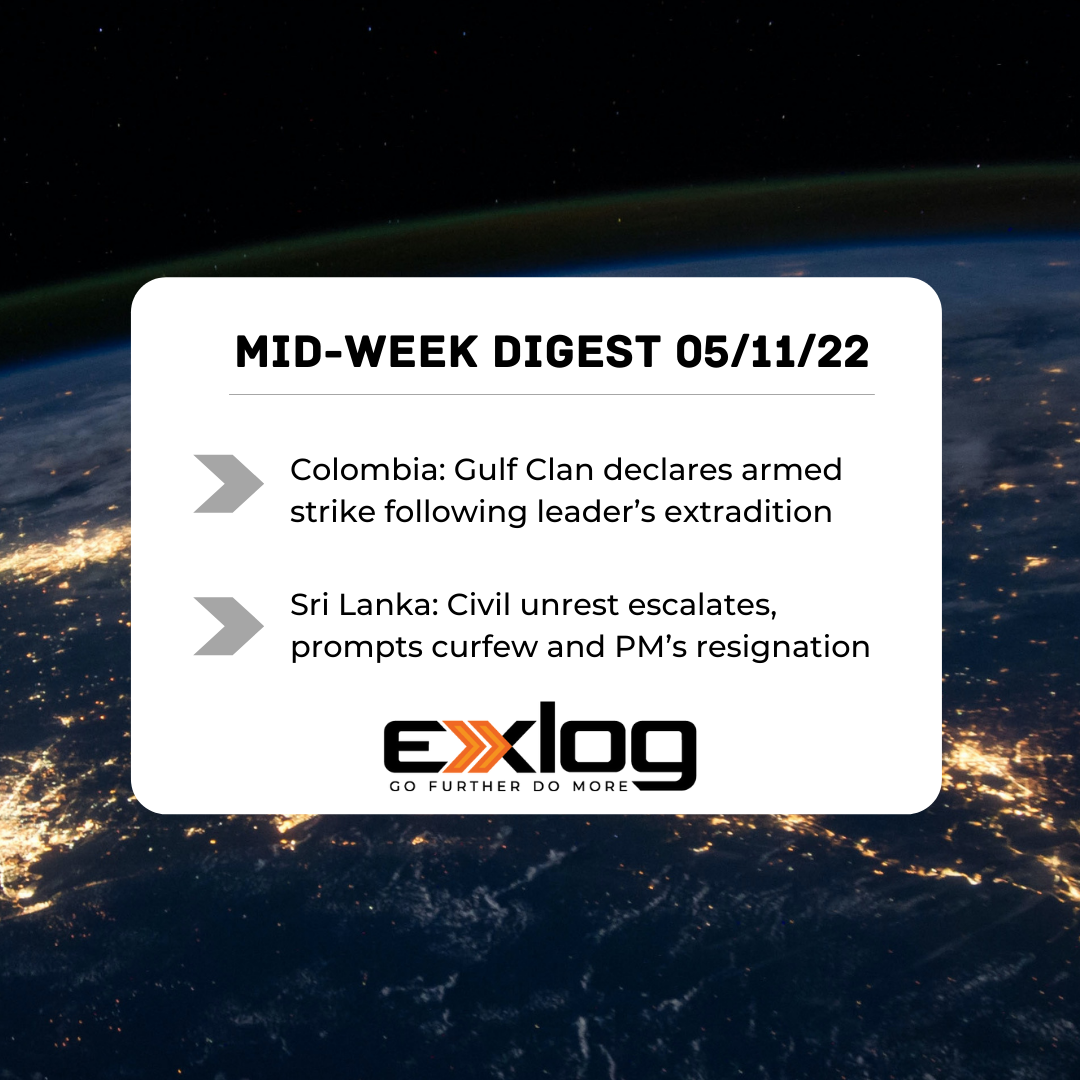Gulf Clan stages armed strike in Colombia and Escalating civil unrest in Sri Lanka
Colombia: Gulf Clan declares armed strike following leader’s extradition
Colombia’s Gulf Clan (CDG) announced a four-day “armed strike” and launched numerous attacks in the northern regions in response to the extradition of former leader Dairo Antonio Úsuga, known as Otoniel, to the US on May 5. While the unrest affected over 90 municipalities in nine of 32 Colombia’s departments, Antioquia, Bolívar, Chocó, Córdoba and Sucre witnessed the most disruption. Gulf Clan members set up roadblocks to obstruct all traffic, ordered local residents to remain inside and forced business closures, which has led to food shortages. According to Colombia’s Ministry of Defense, CDG members burned more than 180 vehicles – mostly on rural highways – for violating the group’s order. There are conflicting reports on casualties; the Special Jurisdiction for Peace – a tribunal formed after the 2016 peace deal between the Colombian government and the Revolutionary Armed Forces of Colombia (FARC) – said that 24 civilians were killed, while government figures indicate that the unrest left three civilians and three police officers dead. In response to the strike, the defense minister deployed an additional 2,000 troops and police to support almost 50,000 security personnel already operating in the region; nearly 90 suspects have been arrested during security operations in affected regions. Armed strikes – short periods of extreme violence intended to destabilize the government – are common in Colombia and generally involve a similar modus operandi that includes arson attacks, intimidation of local population and obstruction of highways that often lead to supply chain interruptions and shortages of basic goods. The CGD is one of the most violent and powerful criminal organizations in Colombia and is one of the largest cocaine distributors in the world – the group reportedly traffics between 30% and 60% of cocaine produced in the country. Otoniel’s arrest is unlikely to significantly impact the group’s operations or trigger internal disputes over leadership as his successors have already been appointed. However, isolated attacks against government targets – particularly Colombian law enforcement authorities – are possible in the near term as the group attempts to demonstrate its influence and operational capability following Otoniel’s extradition.
Sri Lanka: Civil unrest escalates, prompts curfew and PM’s resignation
Despite the resignation of Prime Minister Mahinda Rajapaksa, anti-government protests calling for President Gotabaya Rajapaksa to step down have continued, prompting the government to declare the second state of emergency in a month and impose an indefinite nationwide curfew. Security forces have been given “shoot-on-sight” orders to quell disorder and looting, although these measures have done little to suppress the protests. The unrest escalated on May 9 when government supporters attacked anti-Rajapaksa demonstrators, triggering a violent retaliation. Rioters launched arson attacks targeting at least 41 homes of ruling-party politicians and dozens of buses used by Rajapaksa supporters to travel to Colombo despite the 1900 – 0700 curfew. Thousands of protesters breached the main gate of prime minister’s official residence in Kurunegala – located about 62 miles (99.7 kilometers) northeast of Colombo – prompting police officers to deploy tear gas and fire warning shots in the air. The prime minister and his family were evacuated in the early morning on May 10 following the incident. According to Sri Lanka’s Defense Secretary, nine people have been killed and 219 others have been injured, while 136 properties and 41 vehicles have been destroyed during unrest this week. Rising fuel prices and the COVID-19 pandemic have significantly impacted the country’s economy, leading to the worst economic crisis in decades. In the absence of adequate foreign currency reserves to import essential goods, shortages of medicine, fuel and food – as well as lengthy power shortages – will continue to overwhelm the nation. Sri Lanka has announced the suspension of foreign debt payments to redirect available resources to essential imports, although these measures are unlikely to quell protests while President Rajapaksa remains in office. If the president steps down, he will lose his legal immunity – which seems an unlikely scenario due to several investigations into him and his family – indicating that civil unrest is likely to continue in the short term. Moreover, the current political climate has created fears of a potential military takeover, particularly if violence continues and the unrest escalates further.


